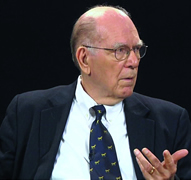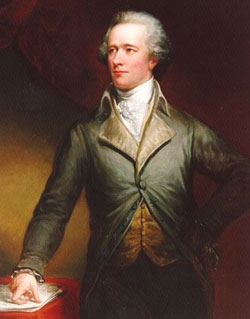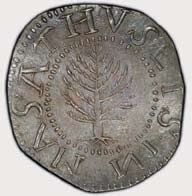Alexander Hamilton’s Credit Principle
September 2011
 Lyndon H. LaRouche, Jr. |
This article appears in the September 23, 2011 issue of Executive Intelligence Review and is reprinted with permission. [PDF version of this article]
The following excerpt is from Lyndon LaRouche’s Jan. 22, 2011 webcast.
The once-victorious states of the United States, once the victory over the British had been secured, found themselves buried in a war debt incurred by the respective former colonies. Hamilton’s genius saved the United States, as the same principle, expressed by the re-enacted Glass-Steagall law of 1933, would save our United States, again, today—if we acted to force through that reform, whatever that requires, immediately, now.
 Alexander Hamilton. |
By creating a Federal Constitution, one designed under the great guiding, inviolable principle of the present Federal Constitution’s General Welfare clause, all of those elected officials who oppose that constitutional principle affirmed as the Preamble of that Constitution, are morally obliged either to change their opinion, or leave office out of a desire not to pollute our government with their unwholesome, misguided opinions.
Hamilton’s turning our United States to national banking under a credit system, rather than a European type of monetarist system, provided the solution, a unique solution which sometimes influenced both European and some American states, in particular, but which rose to a more outstanding degree of durable quality than other leading nations to the present date. On that account, since 1776, the British Empire has sought to subvert and destroy us, from that time to the present day of the anglophile corruption expressed by such putative protégés of the most regrettable, lying, former Prime Minister Tony Blair, as President Barack Obama.
That principle of a credit system, emphasized by Hamilton, rather than a typically European monetarist system, is a principle directly counterposed to the monetarist principle which was established as that principle of usury of the Roman Empire which is continued by the present British empire, and tolerated, still, among most of the nations of Europe and elsewhere, still today.
That principle is also a moral principle, enshrined against that principle of monetarist usury which has been employed to wreck our republic, as has been especially notable since President Nixon’s implicitly treasonous, great criminality of August 1971.[1]
The principle is elementary. It is the principle of the Pine Tree Shilling of the original Massachusetts Bay Colony. Honest debt to the future can be paid only through honest creation of future physical and equivalent wealth, including the development of the relevant creative powers of the individual citizen, and also the children and adolescents of those families.
 Pine Tree Shilling. |
Such debts of a credit system must be paid by the fruitfulness of future production, as this principle was already understood by the Winthrops and Mathers of the original Massachusetts colony. Such debts require that the government delimit such accumulations of debt to the efficient commitment to promote that production. Such debt can be lawfully incurred only by a decision premised on a reasonable expectation of the relevant creation of the increased physical wealth, and of the increased physical productivity of the nation. Debts incurred on the account of financial speculation are not legitimate debts of a government.
This describes, in rather plain language, Alexander Hamilton’s great principle, as embedded in the subsuming intent of the Preamble of our Federal Constitution.
Debts are good, when they are designed to be made good, as by a credit system based on a commitment to increase the creation of net wealth per capita, and per square kilometer of the territory of a nation. The famous Saugus Iron Works typifies the genius of successes which horrified the more backward, and often useless souls reigning jealously over England at that time.
In practice, the success of the U.S. economy has always lain, chiefly, in the production of those public works through which the increase of the physical productivity of the nation is effected, as it is measurable per capita and per square kilometer of territory. No true republic was ever a mere collection of parts; but is the summoning of diversity to the effect of an intended greater and better unity. . . .
[1]. Nixon detached the dollar from gold on Aug. 15, 1971.
